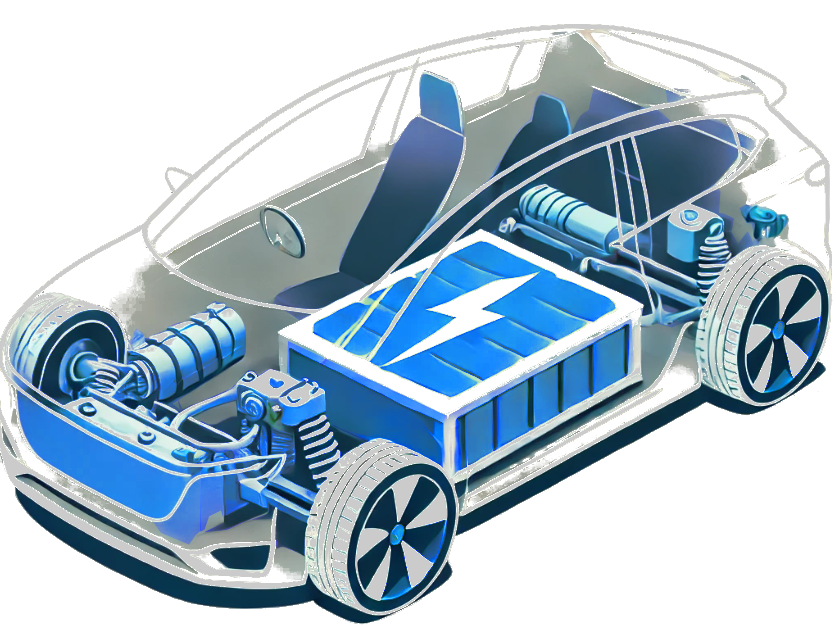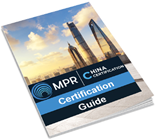your one-stop certification solution!
E-Mobility China
There are various requirements that must be met by the respective vehicle or component manufacturer for the e-mobility sector in China. The complete vehicles as well as manufacturers of batteries (cells, modules, packs), charging systems and powertrains are subject to the Chinese regulations and must obtain all certifications needed. Cost, requirements and process barriers can be difficult to navigate for manufacturers and the OEMs.

Requirements Management
MPR China Certification supports companies in the validation of requirements management and in the assessment of developments in the field of e-mobility in China. In order to meet the requirements for the conformity of products, also over their life cycle, an ongoing review of the regulatory and product-specific requirements is necessary. With our regulatory support you will be informed about all upcoming changes for batteries (cells, modules, packs, systems) and powertrains (e-motors). We are happy to support you in evaluating requirements from your specifications regarding testing, registration, certification and monitoring obligations and to give you an outlook on possible developments and associated costs. You can find more information about our consulting services in the Consulting section.
Product Testing for Batteries and Powertrains
Vehicle manufacturers are required to provide evidence of product conformity in the technical description sheet of the complete vehicle as part of their overall vehicle approval in China. This is often done by accredited test reports, whereby two formats are to be distinguished. The MIIT (Ministry of Industry and Information Technology)/ Gonggao test report and the CNAS (China National Accreditation Service for Conformity Assessment) test report. Both types of test reports must be performed at a CNAS accredited test laboratory in China. MPR China Certification has partnerships with several accredited test laboratories in China and can offer all tests from a single source.
For more information on product testing for the Chinese market, click here: Product tests
Battery Tests
Vehicle manufacturers must demonstrate testing at the cell, module, pack and system levels. It must be ensured that the cells, modules and packs also meet the requirements in China in terms of structure and dimensions. GB/T 34013 provides the general framework for this. In addition to initial tests, which must generally be carried out in MIIT format, there are also requirements for ongoing COP tests, which must be carried out during production.
- Cells
At the cell level, tests according to GB 38031, GB/T 31484 and GB/T 31486 are mandatory and relevant for all common cell types (Prismatic, Pouch, Cylindrical).
- Modules
Module level tests are required according to GB/T 31484 and GB/T 31486.
- Pack/System
The Chinese regulations distinguish between battery packs and battery systems. GB38031 Annex A, A1 and A2 provide a definition. Tests according to GB 38031 can be performed on pack level as well as on system level. Tests according to GB/T 31484 can be performed on module or system level. However, modules are defined in the standard as a sample requirement.
- Battery Management System
Battery management systems are also subject to testing and must be tested in accordance with GB/T 39086 and GB/T 38661.
Testing of Electric Motors
Electric motors and their inverters must be tested in accordance with standards GB/T 18488.1 and GB/T 18488.2. Preparatory clarification with the test laboratories regarding control, fixing and marking regulations is important, especially that the marking of the motors must already be applied to the test samples so that a test report can be issued. In many cases the test labs specify that a member of the manufacturer’s staff should be present during the tests, specifically during the performance tests, to ensure a smooth process. MPR China Certification can arrange for the manufacturer’s staff to accompany the product testing in China including providing an interpreter, organizing letters of invitation for the visa application and travel assistance.
Registration of Battery Systems in China
Manufacturers of cells, modules and packs/systems must register with the MIIT authority in China in accordance with regulation GB/T 34014 and mark their products for current series and after-sales. The management of the assigned numbers as well as their structure must be precisely defined and displayed.
Battery system registration involves several steps and requires a Chinese cell phone number and a valid passport of the authorized person named in the commercial register for registration and ongoing login. For foreign manufacturers we can offer co-use of a Chinese cell phone number as an option.
For more information on the registration process and scope, see Battery System Registration.
CCAP Certification and CQC Certification
While a CCC obligation for batteries of household products was introduced in China at the end of 2022, there is currently no obligation for CCC certification in the area of batteries and power trains (e-motors) for electric vehicles. There is the possibility to approve batteries (CCAP-GZ-3703-2020 or CQC12-464221-2017) as well as e-motors (CQC11-469122-2015) according to the implementing regulations of CCAP/CQC in the course of a voluntary certification. There are several advantages to having the voluntary certification to both the manufacturer and the OEM. The main advantages are the ongoing third party oversight to confirm continuous compliance to Chinese regulations and to take the burden off of the OEM to prove their supplier‘s compliance for their type approvals. Vehicle manufacturers can largely transfer the topic of change management to the supplier, since in this case, analogous to a CCC certification, a certificate number is specified in the technical description sheet of the complete vehicle. MPR China Certification assumes that the authorities CNCA or SAMR will implement the CCC obligation on e-motors as well as traction batteries in the next few years. If CCC becomes mandatory, the voluntary CCAP or CQC certification can be the basis for this CCC certification and make direct conversion possible. More information on the procedure, requirements and processes can be found on the CCAP/CQC certification page.
Customs Clearance Services
Test samples (batteries, e-motors, etc.) need to be imported into China for product testing and validation. MPR supports the process of customs clearance and the local transportation from customs to the relevant test laboratory in China. MPR offers consulting services regarding requirements for transport and import including product testing according to UN 38.3, requirements according to IMGD-Code or IATA-DGR (ICAO-TI), classification of Li-batteries (UN 3480, UN3481). MPR can also provide a consignee in China for the import of the test samples.
Your One-Stop Certification Solution.
Our complete package for product certifications for China.
Information on the requirements of the Chinese market and other target markets
Confirmation of the relevant applicable standards and regulations and selection of the appropriate approved test laboratory and authority
Notification of the required test samples
Organization of customs clearance
Carrying out the product tests
Support in the supervision of the tests by the manufacturer’s employees
Provision of translations (test reports, standards, etc.)
Complete organization of certifications (including audit)
Advice on all issues related to registrations and marking regulations
Contact us!

MPR China Certification – expert consulting and implementation of certification projects worldwide.
Download the free CCC-Certification booklet!
We also support you in the following areas:
| Area | Product group | Regulations | Description |
| Product Testing (CNAS-, MIIT-, COP-test reports) | Cells, Modules, Packs for Electric Vehicles | GB 38031-2020 | Safety requirements for traction batteries for electric vehicles |
| Product Testing (CNAS-, MIIT-, COP-test reports) | Cells, Modules, Packs for Electric Vehicles | GB/T 31484-2015 | Requirements and test methods for lifecycle of traction batteries for electric vehicles. |
| Product Testing (CNAS-, MIIT-, COP-test reports) | Cells, Modules, Packs for Electric Vehicles | GB/T 31486-2015 | Electrical performance requirements and test methods of traction batteries for electric vehicles |
| Product Testing (CNAS-, MIIT-, COP-test reports) | Cells, Modules, Packs for Electric Vehicles | GB/T 31467.1-2015 | Lithium-ion traction battery packs and systems for electric vehicles - Part 1: Test methods for high power applications |
| Product Testing (CNAS-, MIIT-, COP-test reports) | Cells, Modules, Packs for Electric Vehicles | GB/T 31467.2-2015 | Lithium-ion traction battery packs and systems for electric vehicles - Part 2: Test methods for high energy applications |
| Product Testing (CNAS-, MIIT-, COP-test reports) | Battery Management-Systems | GB/T 38661-2020 | Specifications for battery management systems for electric vehicles |
| Product Testing (CNAS-, MIIT-, COP-test reports) | Battery Management-Systems | GB/T 39086-2020 | Functional safety requirements and test methods for battery management systems for electric vehicles |
| Product Testing (CNAS-, MIIT-, COP-test reports) | Battery Management-Systems | QC/T 897-2011 | Technical specification of the battery management system for electric vehicles |
| Product Testing (CNAS-, MIIT-, COP-test reports) | Cells, Modules, Packs for Electric Motorcycles and Mopeds | GB/T 36672-2018 | Lithium-ion batteries for electric motorcycles and electric scooters |
| Product Testing (CNAS-, MIIT-, COP-test reports) | Cells, Modules, Packs for Electric Motorcycles and Mopeds | GB/T 36943-2018 | Model designation and labeling requirements for lithium-ion batteries for electric bicycles |
| Product Testing (CNAS-, MIIT-, COP-test reports) | Cells, Modules, Packs for Electric Motorcycles and Mopeds | GB/T 36972-2018 | Lithium-ion battery for electric bicycles |
| Product Testing (CNAS-, MIIT-, COP-test reports) | Cells, Modules, Packs for Electric Motorcycles and Mopeds | QB/T 2947.3-2008 | Batteries and chargers for electric bicycles Part 3: Lithium-ion batteries and chargers |
| Product Testing (CNAS-, MIIT-, COP-test reports) | Other Batteries | GB/T 18333.2-2015 | Zinc air batteries for electric vehicles |
| Product Testing (CNAS-, MIIT-, COP-test reports) | Other Batteries | QC/T 741-2014 | Automotive supercapacitor |
| Product Testing (CNAS-, MIIT-, COP-test reports) | Other Batteries | QC/T 742-2006 | Metal hydride nickel accumulator for electric vehicles |
| Product Testing (CNAS-, MIIT-, COP-test reports) | Environmental Testing | GB/T 30038-2013 | Protection class for electrical and electronic equipment of road vehicles (IP code) |
| Product Testing (CNAS-, MIIT-, COP-test reports) | Environmental Testing | GB/T 4208-2017 | Housing protection class (IP code) |
| Product Testing (CNAS-, MIIT-, COP-test reports) | Environmental Testing | GB/T 28046.2-2019 | Environmental conditions and tests for electrical and electronic equipment of road vehicles - Part 2: Electrical loads |
| Product Testing (CNAS-, MIIT-, COP-test reports) | Storage | GB/T 36276-2018 | Lithium-ion batteries for energy storage |
| Product Testing (CNAS-, MIIT-, COP-test reports) | Storage | GB/T 36558-2018 | General technical specifications for electrochemical energy storage systems in power systems |
| Product Testing (CNAS-, MIIT-, COP-test reports) | Powertrain, Electric Motors | GB/T 18488.1-2015 | Drive systems for electric vehicles Part 1: Specifications |
| Product Testing (CNAS-, MIIT-, COP-test reports) | Powertrain, Electric Motors | GB/T 18488.2-2015 | Drive systems for electric vehicles Part 2: Test methods |
| Voluntary Product Certification (CCAP / CQC) | Battery Management Systems, Cells, Modules, Packs | CQC12-464221-2017 | Implementation rules CQC for batteries of vehicles |
| Voluntary Product Certification (CCAP / CQC) | Battery Management Systems, Cells, Modules, Packs | CCAP-GZ-3703-2020 | Implementing rules CCAP for batteries of vehicles |
| Voluntary Product Certification (CCAP / CQC) | Powertrain, Electric Motors | CQC11-469122-2015 | Implementation rules CQC for electric motor drive systems |
| Battery System Registration | Cells, Modules, Packs for Electric Vehicles | GB/T 34014-2017 | Coding rules for car batteries |
| Dimensions | Cells, Modules, Packs for Electric Vehicles | GB/T 34013-2017 | Specifications and dimensions of traction batteries for electric vehicles |
| Recycling | Cells, Modules, Packs for Electric Vehicles | GB/T 34015-2017 | Residual energy detection for vehicle battery recycling |






